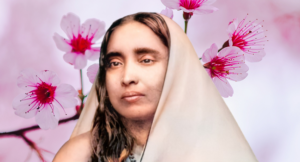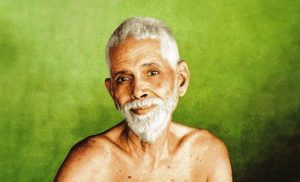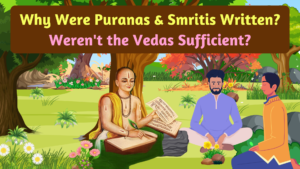Some 400 years ago there lived in a forest, near the village of holy Braja, a great devotee by the name of Sanatan. He was the favorite disciple of Sri Gouranga (Chaitanya Mahaprabhu), the immortal prophet of Nadia. Prior to renouncing the world to become a devout sannyasin (monk), Sanatan used to be the prime minister to the Nawab of Bengal.
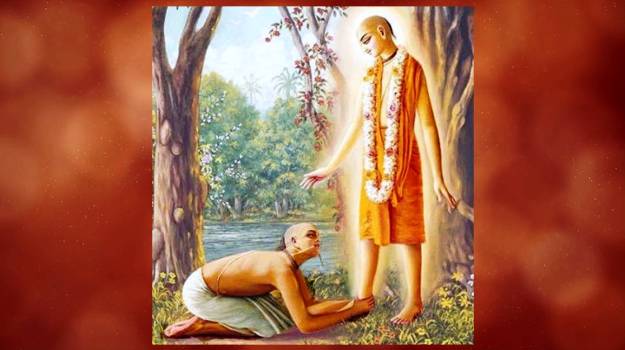
As prime minister he lived a life of tremendous opulence and power. But upon meeting his Guru, Sri Chaitanya Mahaprabhu, Sanatan, renounced the world and began to live as a sannyasin in Vrindavan. He drew his daily sustenance by begging alms (bhiksha) from people.
There are four kinds of bhikshas prescribed for a sannyasin and Sanatan was living by the last one, known as madhukari — a word which is derived from madhukara, meaning a bee. As a bee collects honey from different flowers so a bhikshu or religious mendicant who observes madhukari begs his food from, different houses bit by bit, without taking it all from one place.
So earnest and loving a devotee of the Lord, was Sanatan that he could not partake of the crumbs of bread collected by madhukari — dry and hard as stone though they were — without first offering them to the Lord with a sufficient quantity of cool and sweet water of a beautiful well.
Thus when the days of Sanatan were passing peacefully and pleasantly in deep devotion, one night his Beloved Lord Krishna appeared before him in a dream and told him, “Sanatan, I can no more eat your coarse bread; you put not even a grain of salt with it. Please do give me a little salt henceforth that I may devour it with more ease.”
Sanatan awoke from the dream and repented very much his conduct towards his Beloved Lord. Since that morning whenever Sanatan went out for his alms he never forgot to beg some salt for his Lord.
In this way Sanatan engaged his mind in devotion every day more and more, and God who does not care for any thing of the world from his devotee, but for his genuine love for Him, was pleased with Sanatan. However just by way of play (leela) which He is so fond of indulging in with His favorites, as if to see how zealously attached Sanatan was to his ascetic habits and practice of renunciation, He appeared before Sanatan once again.
In his dream Sanatan saw the Lord come to him and say in a piteous strain, “Dear Sanatan, it is very good of you to give me a pinch of salt every day with the bread, but I should very much like you to supply me with a few drops of ghee (clarified butter) to make the hard and dry pieces of bread a little soft and moist.” Sanatan awoke, but this time not with any remorse in his mind as before.
He went directly to the image of the Lord he used to worship not just daily, but at every moment in his heart and began to talk to Him thus: “O Lord at first you asked for some salt and I readily acquiesced in your reasonable demand; you know what worry and loss of time I suffer for that. Now you want ghee and then probably after some days you might ask for sweets. I am sorry but I cannot comply with your request any more. If you really need better food than what I can offer you, please try for a Bhakta (devotee) who has wealth. I am a poor mendicant and a Vairagi (renunciate). Pray do not destroy my Vairagyam (renunciation, tyag).”
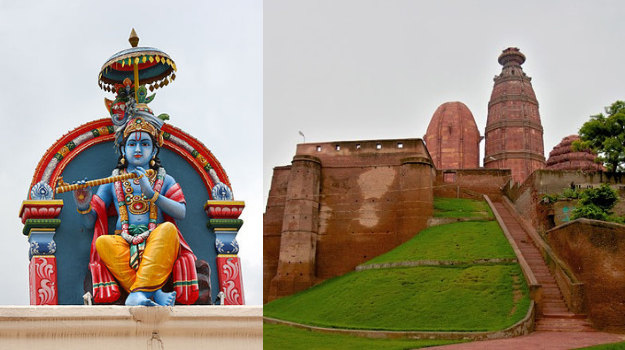
And lo! in a very short time there came a millionaire who raised a grand temple for the Lord Krishna of Sanatan and made arrangements for His seva (daily worship with offerings of food and sweets) in a princely style and that temple is the famous Madan Mohan of Vrindavan of the present day.
And here we all look up to Sanatan with a deep sense of admiration for his example of Tyag (renunciation) and remain speechless at the unique instance of his refusing even God, only for fear of losing the spirit of Tyag which is so much neglected in these days of so-called advancement and culture.
The above article has been taken from the August 1898 issue of the Prabuddha Bharata Magazine. I have modified the article a little to improve clarity and readability. To read recent issues of the Prabuddha Bharata Magazine online click here.

